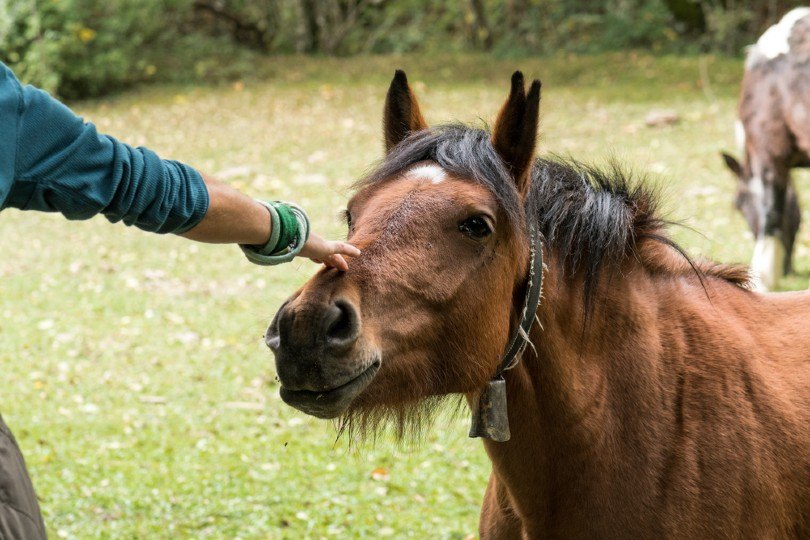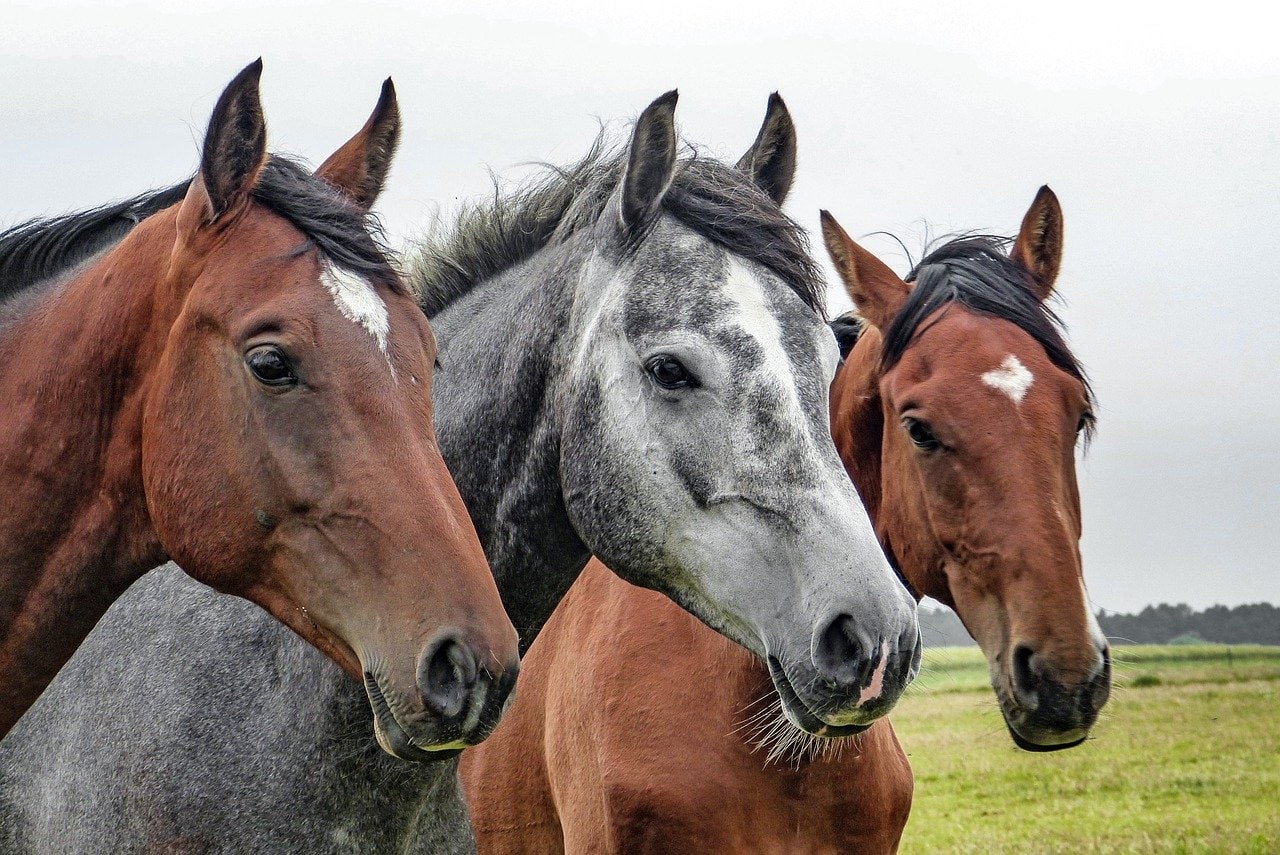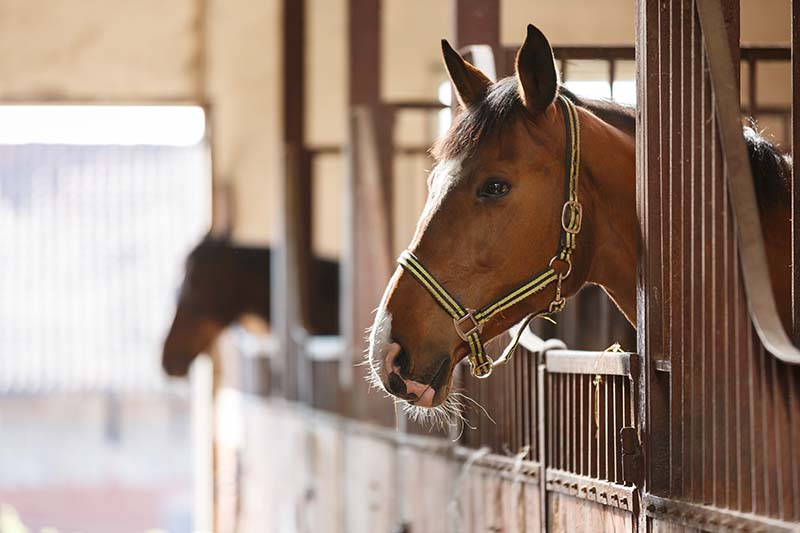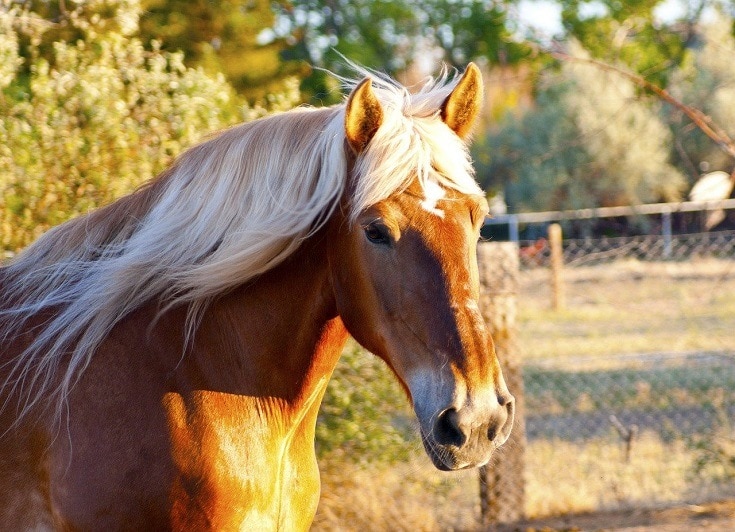
Clydesdales are a beautiful Scottish breed of draught horse. They’re large and powerful, traditionally used for farming and road haulage. Modern Clydesdales are used mainly as carriage and show horses. There’s even a team of them known as the Budweiser Clydesdales that are used for promotions and commercials by the Anheuser-Busch Brewing Company.
This breed is good for more than just beer advertising and carriage rides, however. They are steady mounts, making them perfect for therapeutic and trail riding. They’re calm, agile, strong, and gentle, not to mention beautiful.
If you’re considering bringing a Clydesdale home to your farm, you should familiarize yourself with the costs of owning such a big breed which can start at $1000 to buy one of these horses at the lower end of the scale. Keep reading to find out how much it costs to adopt a Clydesdale and the monthly fees you should expect with horse ownership.
Bringing Home a New Clydesdale Horse: One-Time Costs
Buying your Clydesdale is one of the only one-time costs you’ll incur as a horse owner. Unfortunately, you’re unlikely to find many Clydesdales in good shape for free or through local rescues, though you certainly can try. Realistically, most people acquire their horses through breeders, which, as you can imagine, can get quite pricey.
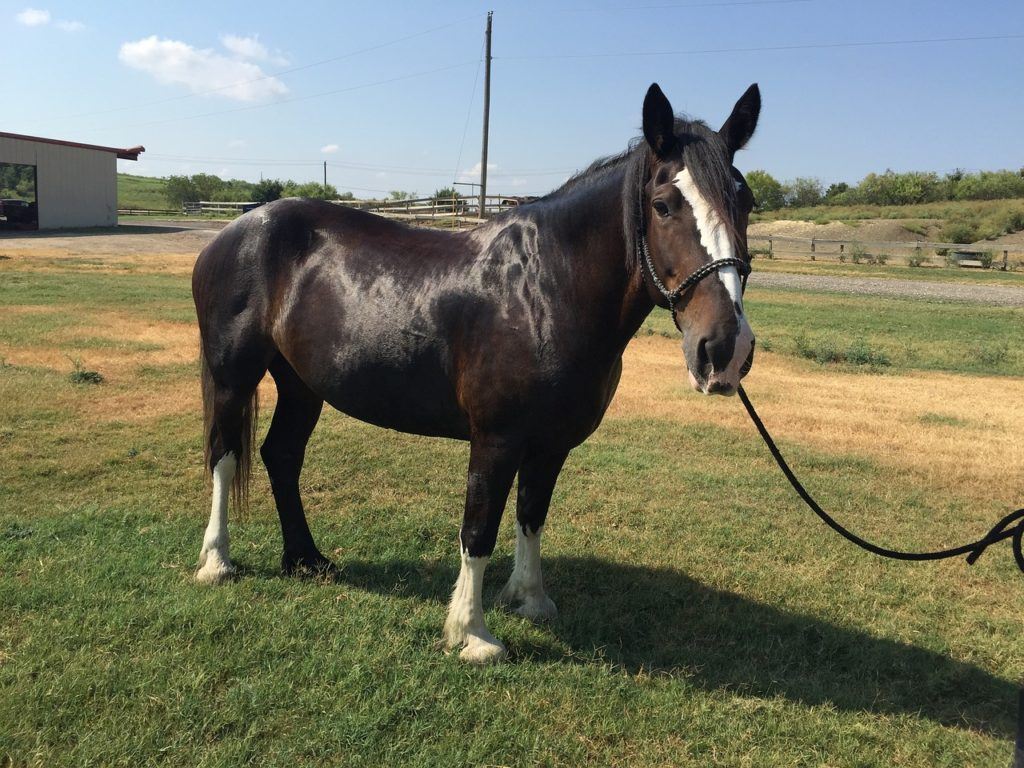
Free
It is highly unlikely that you will encounter a Clydesdale horse for free, but if you do, more power to you. You may luck out and find someone locally who is looking to donate their horse, but the chances are slim.
Adoption
Adoption is another way you could acquire your Clydesdale, though, again, it’s not likely you’ll find any available. That said, you can research rescue organizations in your area to see if any are looking to rehome a Clydesdale. Unfortunately, most horses you’ll find at local rescue shelters have special needs or come into the care of the rescue as the result of cruelty investigations.
The cost of adoption will vary greatly depending on the needs and health of the horse in question.
Breeder
Breeders are, by far, the most common way someone would acquire a Clydesdale. The cost to buy one from a breeder will vary based on many factors, including bloodlines, quality, age, size, color, and training level. You may get lucky and find one for the lower end of the quote above, but most are priced between $2,000 and $5,000. A top-tier or award-winning Clydesdale can fetch at least $20,000 or more!
Initial Setup and Supplies
The cost to acquire your Clydesdale will likely be the most significant investment, especially if you’re buying one from a breeder. That said, if you opt for building your horse barn instead of boarding, this will become your biggest investment. Depending on the size and build quality, this can cost anywhere between $2,500 and $11,000 or more.
Other than that, you’ll need some additional equipment and accessories before welcoming your new Clydesdale home.
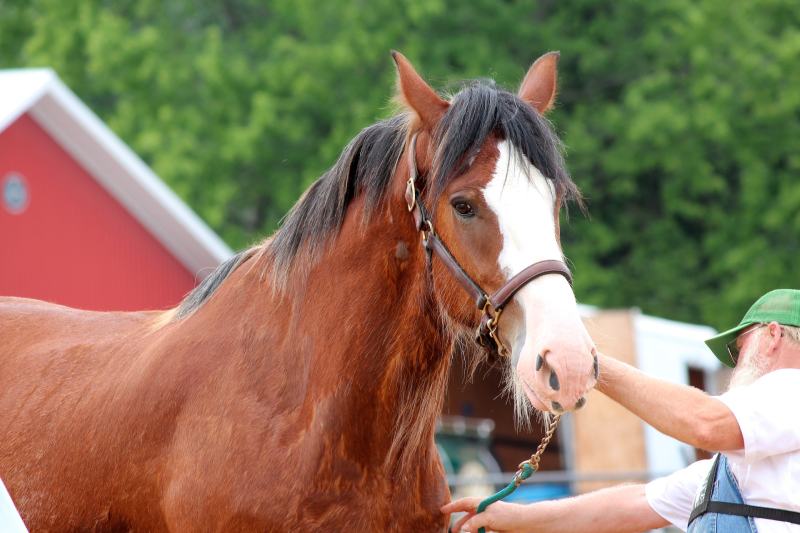
List of Clydesdale Horse Care Supplies and Costs
| Horse barn (optional) | $2,500 –$11,000+ |
| Saddle | $500–$2,100+ |
| Bridle | $70–$1,000 |
| Halter & lead | $10–$125 |
| Feed | $20–150 |
| Treats | $8–$85 |
| Hay | $4-$20 |
| Grooming Kit | $50–$120 |
| Horseshoes | $75–$175+ |
| Feed Bucket | $50 |
| Trailer | $1,000–$8,000+ |
| Winter blankets | $50–$200 |
| Saddlebags | $10+ |
| Equine first aid kit | $100–$200 |
| Water trough | $50–$200 |
| Feed bucket | $50+ |
| Wheelbarrow (optional) | $100+ |
| Stall mats | $35/each |
| Toys | $10–$25 |
How Much Does a Clydesdale Horse Cost Per Month?
Horse ownership is not cheap, especially as far as Clydesdales are concerned since they’re such a large breed that requires a lot of space and feed. You should expect to pay between $620 and $2,500 per month to keep your horse happy, fed, and healthy.
Health Care
Your horse should see the vet yearly for teeth cleaning, floating, and vaccinations. Deworming is typically once or twice a year, though it may be more often depending on stocking density and pasture contamination. If your vet is coming to you or the boarding facility where your horse lives, add an additional $35 to $75 fee.
Veterinary exams and routine maintenance will cost between $350 and $600 annually, provided no emergencies arise. Emergencies, of course, are never planned and can add up quickly. An after-hours emergency can run you between $200 and several thousand if hospitalization or surgery is necessary.
These estimates assume your horse is healthy. If you’ve adopted a Clydesdale with special needs, you should expect to pay on the higher end of the above-quoted spectrum.
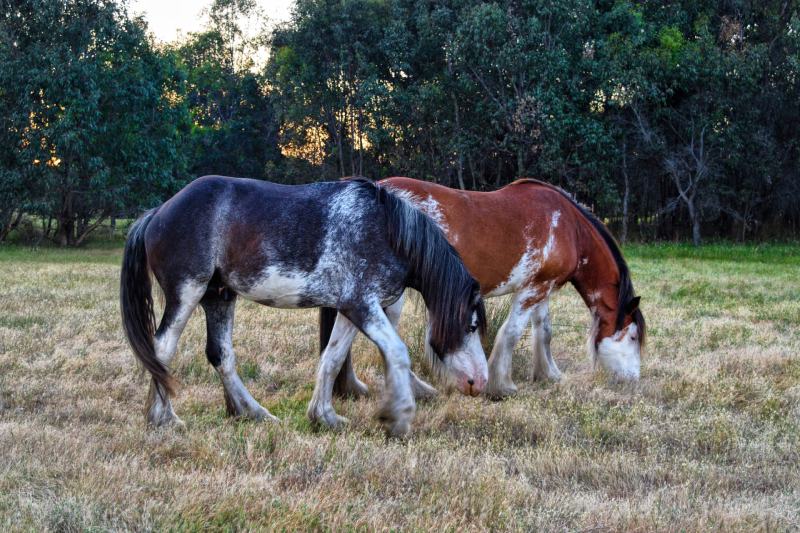
Food
The age and workload of your Clydesdale factor into how much you’ll need to feed it. Bear in mind that this breed is larger than other horses, so it will need more feed, up to twice as much as other breeds! Clydesdales need to eat around 2% of their weight daily, eating up to 20 quarts of feed and 50 pounds of hay daily.
A 50-pound bag of horse feed can run you between $15 and $50. Hay, another important aspect of the Clydesdale diet, can cost between $100 and $500 a month.
Grooming
Grooming equipment is rather affordable. You can acquire a fully stocked grooming kit for less than $50 if you’re thrifty. These kits will give you the things you need to do easy, daily grooming tasks like brushing, hoof picking, and shampooing.
Horse hooves need to be trimmed for them to function properly. A trimming should cost between $20 to $70 every second month. Horseshoes or more intensive therapeutic maintenance can cost upwards of $150.
The cost to get your Clydesdale clipped will vary, but you should expect to pay around $150 for a full-body clip.
Pet Insurance
Equine insurance is worth looking into, especially since the cost of owning a healthy Clydesdale is considerable. Imagine how much more you’d be on the hook for if your horse were to fall ill.
Generally, you should expect to pay between $150 and $500 annually for insurance. But, of course, as with any insurance policy, your monthly premium will depend entirely on your level of coverage and deductibles.
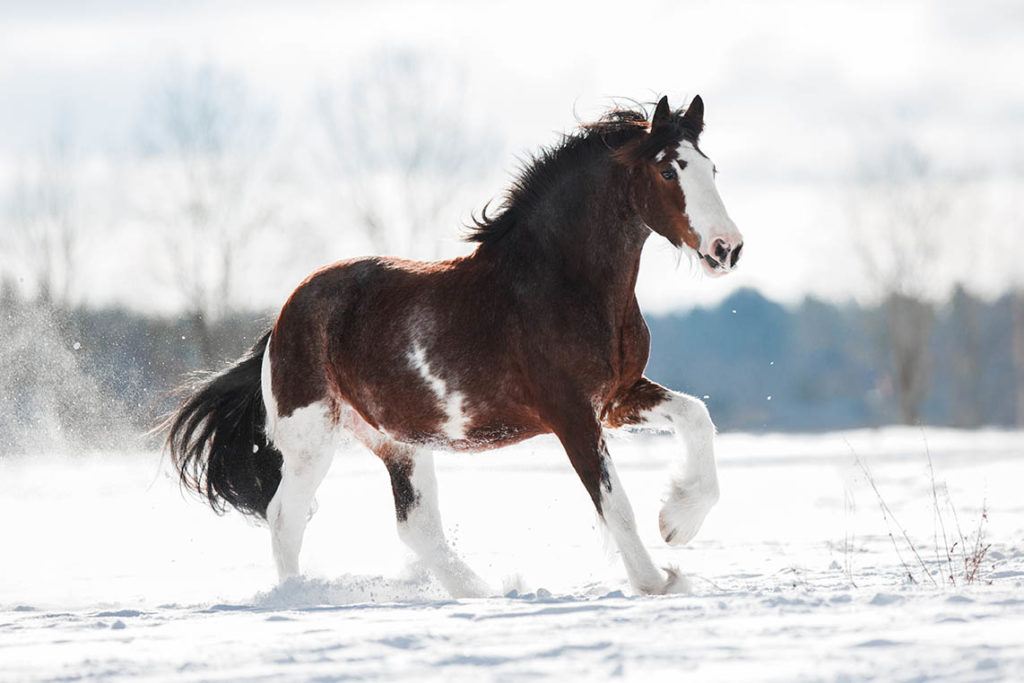
Environment Maintenance
If you’re keeping your horse in a stall at home, you’ll have to factor in the cost of changing the bedding regularly. You’ll also need to consider the charges of upkeeping your fence and your barn/stall. Bedding is necessary to cushion your horse’s feet, absorb urine, and rest.
Salt blocks are great for the warmer months as horses lose a lot of essential minerals in their sweat. If these minerals are not replenished, it can lead to an electrolyte imbalance.
Fly protectants are a must during summer to keep pesky flies from landing on your Clydesdale.
If your horse lives in a boarding facility, they will likely factor in the environmental maintenance costs in your boarding fees.
| Stall bedding | $30–$60/month |
| Salt or mineral blocks | $10–$25/month |
| Fly protectants | $5–10/month |
Entertainment
Horses, like other animals, need mental and physical stimulation to stay happy and healthy. Unfortunately, the controlled barn environment does not provide the enrichment your Clydesdale needs. A wide range of pasture and stall toys is a must to keep your horse engaged, enriched, and happy. Exercise balls are great for pasture toys, while feeder toys are great for in-stall entertainment.
Depending on how rough your Clydesdale is with its toys, you probably won’t need to buy new ones every month.
Living Arrangements
If you keep your horse at home in a barn or stall, you should set aside a small amount of money monthly to cover unforeseeable repairs. Be sure to factor in costs for repairing and upkeeping fencing, hay storage, and hay feeders.
If you don’t have the space to keep your horse at home, you’ll need to look at boarding or renting a pasture. The cost of boarding will vary greatly depending on what type of board (e.g., pasture, stall, mixture) and the level of care the facility provides. Full care will include feed, hay, turnout, etc., and can cost $1,000 or more a month.
Pasture rental is typically much cheaper, between $50 and $200 monthly.
Total Monthly Cost of Owning a Clydesdale Horse
Considering all factors, the total monthly cost of owning a Clydesdale is, at minimum, several hundred dollars. But, of course, this amount will vary considerably throughout the year depending on the time of year and your chosen living arrangements.
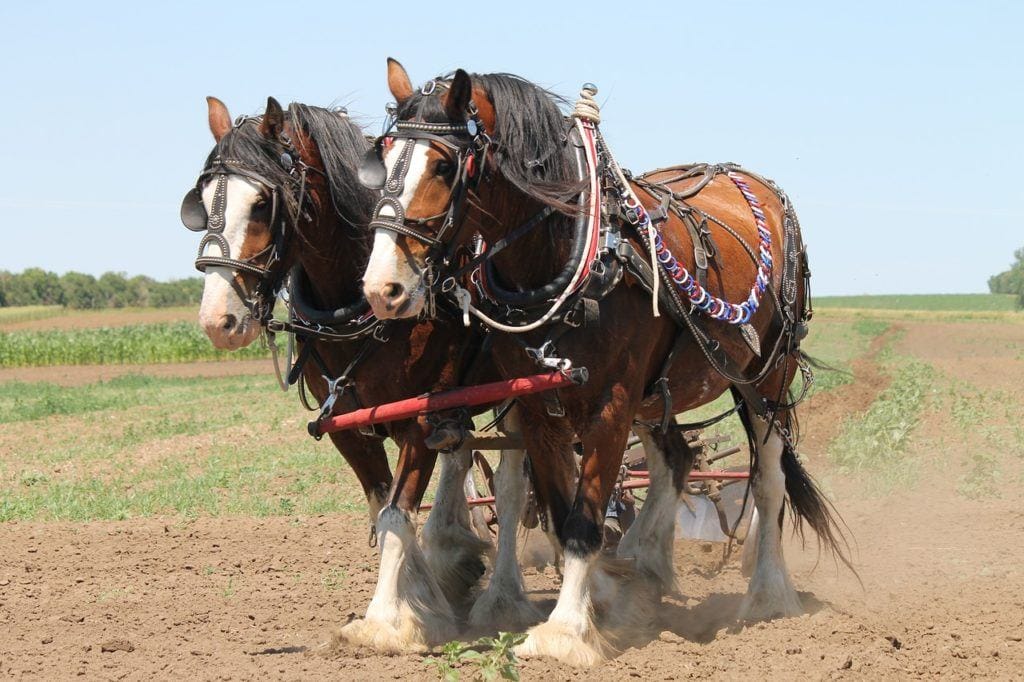
Additional Costs to Factor In
A significant cost you must consider before adopting your Clydesdale is transportation. This breed can weigh between 1,800 and 2,300 pounds, so transporting it anywhere is no simple feat. A horse trailer can cost anywhere between $2,000 and $30,000!
If you don’t have space in your budget for a trailer, you’ll need to look at transportation services which can vary greatly in cost depending on what company you’re using and the gender and size of your Clydesdale. U-Ship, a horse transportation company based in Canada, charges per kilometer and distance ($1.86 per km for less than 100 km and $1.10 per km for trips less than 1,000 km).
Another significant cost you should consider is emergency care. Considering the average horse vet visit costs around $300, you can imagine how quickly your bill will add up in emergencies.
Owning a Clydesdale Horse on a Budget
We’re not going to sugar coat it; it would be challenging to own a Clydesdale horse on a budget. On the low end of the spectrum, you should expect to pay around $4,000 annually, with $23,000 being on the higher end. That’s not even factoring in the costs to acquire your horse or the initial setup fees. Your true annual costs are more likely to fall somewhere between these two extremes, but you still should wait until you’re in a good place financially to adopt a Clydesdale.
Consider looking at horse ownership alternatives in the meantime, such as riding lessons and leashing or fostering a horse.
Saving Money on Clydesdale Horse Care
There are several ways you can save money on your monthly Clydesdale horse care.
Conclusion
You should expect to pay between $100 and $5,000 to acquire your horse, though a show-quality Clydesdale can cost much more. Next, your initial setup fees will range between $2,500 and $22,500, depending mostly on whether you decide to build your horse a barn or if you’ll be boarding it. Finally, the monthly fees to expect are roughly $345 to $1,900, depending largely on whether you’re boarding your horse or keeping it close to home.
Owning a Clydesdale certainly isn’t an inexpensive venture, but it’s rewarding and worth every penny. Your Clydesdale will hopefully be your companion for the next 25 to 30 years, so be realistic about whether it’s in your budget to adopt one of these beautiful horses.
Featured Image Credit: Studio10-27, Pixabay



